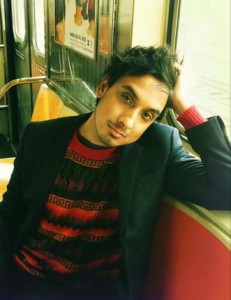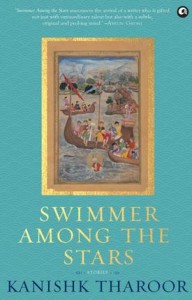‘A sponge of history’ An interview with Kanishk Tharoor
(I interviewed Kanishk Tharoor on his collection of short stories — Swimmer Among the Stars, published by Aleph. The interview was published online on 30 January 2016 and will be in print on 31 January 2016. Here is the original url: http://www.thehindu.com/books/literary-review/kanishktharoor-talks-to-jaya-bhattacharji-rose-about-his-book-swimmer-among-the-stars-stories/article8171724.ece )
Kanishk Tharoor about writing in his pyjamas in the company of many cups of tea.
Kanishk Tharoor’s debut book Swimmer among the Stars: Stories is a magnificent collection of short fiction. It transports one into a different world, especially with its minute details, achieving the near-impossible with words. Tharoor’s short fiction was nominated for a National Magazine Award in the U.S. He writes the ‘Cosmopolis’ column for The Hindu Business Line’s BLink. He is currently at work on a radio series to be aired on BBC Radio in the spring of 2016, and on a novel. He lives in New York City.
Excerpts:
How did these stories grow? Out of a line, character or a memory?
The stories have quite separate points of origin. Some — like ‘Elephant at Sea’ — sprang from a real life story told to me when I was younger. Others were sparked by observations, an experience, sometimes just a line or an image. The work of the story would become justifying that line or image.
How many years were they in the making were these stories? 
About a decade. The oldest story in the collection, ‘The Loss of Muzafar’, was written when I was 19. Most of the stories in the collection were written in the last five years.
How do you start a story? Do you plan in detail?
I begin with an image or idea or adventurous premise. I rarely plan — you can get away with that in short stories more easily than you can in a novel. I find that I do my best thinking as I write, so the story takes shape in the midst of its writing.
These stories are not historical fiction yet have a strong whiff of history in them. How much research does each story require?
‘Research’ makes it sound like a kind of deliberate project. The truth is I’m a helpless sponge of all sorts of historical material, particularly of rather obscure or little-known moments in history. The only research I really did was for the last story in the collection, ‘The Mirrors of Iskandar’, which retells episodes from legends about Alexander the Great that were known in the medieval world from Scotland to the Straits of Malacca.
I get the impression upon reading Your stories seem that it is like a fine blend of political news reporting and fiction, as in ‘The Fall of an Eyelash’ about refugees or the conversations in ‘A United Nations in Space’ revolving around international diplomacy. Is this intentional?
I don’t know if I’d call it a blend of political reporting and fiction… this is all very much fiction! But I am interested in political and social issues, and that interest filters into my fiction.
What is your writing routine?
I don’t really have a routine, as I inconsistently have time to devote to my fiction. When I write, it’s often in my pyjamas and in the company of many cups of tea.
In this collection you have very distinct voices and stories revolving around languages including the title story. This fascination with linguistic abilities that you capture so well in the diction makes me wonder if at times you write in public spaces too to capture the variety of languages? Was NYC with it being a repository of many languages an inspiration?
I actually do almost all my writing at home. But yes NYC was a source of inspiration for the story even though it wasn’t set there. NYC is actually a repository of dying languages that have survived in diaspora even as they have disappeared in their countries of origin. I think, more generally, there is a lot of NYC in the spirit of the collection, a city that in many ways has as its jurisdiction the world.
What writer do you admire the most and what would you like to ask them?
I’ll say the Portuguese novelist Jose Saramago. I’d ask him about where in Lisbon his ghost likes to wander.
How do you read? In print or digitally or both? Are you an eclectic reader?
I read literature almost solely in print. I do not own an e-reader.
I read news mostly online, though I have subscriptions to a few journals. In terms of books, I read mostly fiction but I also consume history, politics, and other non-fiction subjects.
Who are the authors you admire and who have influenced you?
Too many to list. Perhaps predictably, the likes of Toni Morrison, Saramago, Italo Calvino, Borges, Amitav Ghosh and so on. But also the 19th century collectors of folklore, medieval Persian poets, and ancient tellers of epic around the world.
30 January 2016


No Comments